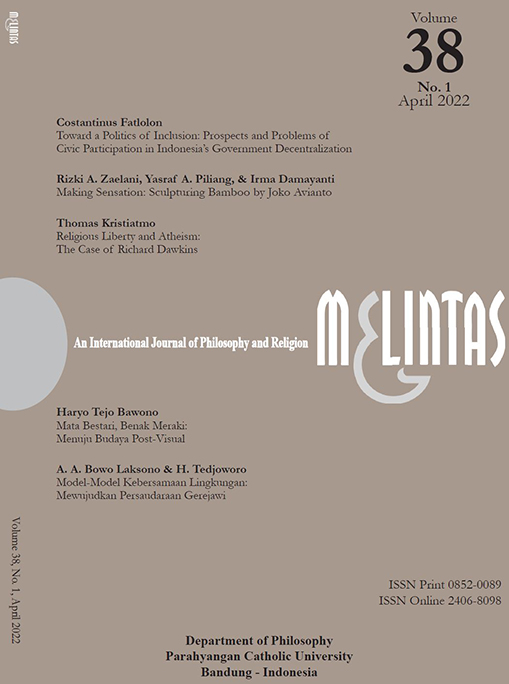Vol. 38 No. 1 (2022)

Not everyone is willing to stop for a moment. Stopping is considered counterproductive. When someone stops thinking, thoughts are lost. No creativity and no movement. But that might be true when stopping means doing nothing. Stopping, looked at differently, is actually moving. Our mind is reflecting and imagining in a way we do not understand normally. Perhaps in the state of stopping we are not really frozen, but are in the state of an extreem slowness. Reason can stop functioning. Our mind, on the other hand, cannot, as long as we are alive. Stopping remains as a real moment that will happen anytime, even when our self does not want to stop.
Now we can stop with whatever we are doing if, and only if living ideas still matter to us. This edition of Melintas brings various areas into a moment of reflection. The first article assesses the shortcomings and possibilities of deepening civic participation in Indonesia’s government decentralization. The local people must be educated and capacitated to maximise the benefits of government decentralization, while civil society groups step in to practice democratic principles in civic participation and lawmaking. The second article sees Joko Avianto’s three-dimensional works exhibited in Frankfurt, Germany, and Yokohama, Japan, as examples of Deleuze-Guattari’s explanation of monuments of sensations in their embodiment. Art is special because of its capability to both transcend and surpass the limits to rediscover or restore the boundless. The third article, through the Second Vatican Council document Dignitatis Humanae, sees religious liberty in the face of atheism, which in this article is focused on atheism as promoted by Richard Dawkins. The fourth article observes how in today’s cinematic society or visual and digital culture, the boundaries or bridges between the eye and the mind are becoming increasingly blurred. It invites the readers to an awareness of the trend towards the fading boundaries, and simultaneously deals with the dangers of unawareness. The fifth article addresses the issue of the Catholics’ decrease of participation in the parochial lingkungan by offering some models of togetherness, inspired by the Scriptures and the Church documents such as Evangelii Gaudium and Fratelli Tutti. These can be fresh alternatives for realising ecclesial communion among the faithful.
Stopping other activities gives us time to reflect on the tiny moment of now. People might think that we are doing nothing, but that does not really matter compared to the reflections surfacing in our mind. The mind is moving and alive not only because of the great ideas, but also because of the deep reflections that awaken our existence.

